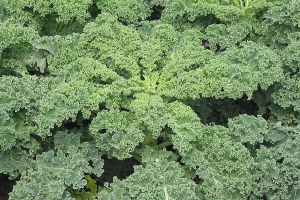 I think it’s safe to say that leafy greens like kale are super good for you, and especially so if it’s organic. Kale is loaded with vitamins and minerals, more so than most vegetables, and it’s pretty easy to get a hold of these days. However, when you buy a bushel of kale, there may be some factors that you’re not accounting for. It’s possible that the kale you’re eating, even if it’s organic, might be making you sick.
I think it’s safe to say that leafy greens like kale are super good for you, and especially so if it’s organic. Kale is loaded with vitamins and minerals, more so than most vegetables, and it’s pretty easy to get a hold of these days. However, when you buy a bushel of kale, there may be some factors that you’re not accounting for. It’s possible that the kale you’re eating, even if it’s organic, might be making you sick.
In a recent study, molecular biologist Ernie Hubbard found that kale—along with cabbage, broccoli, cauliflower, and collard greens—is a hyper-accumulator of heavy metals like thallium and cesium. What’s more, traces of nickel, lead, cadmium, aluminum, and arsenic are also common in greens, and this contamination affected both organic and standard produce samples.
The source? Its soil. “If it’s left in the ground, the leafy greens are going to take it up,” Hubbard told Craftmanship magazine.
This news gives us pause because kale has taken the culinary world by storm over the last few years: Back in 2007, the U.S. Department of Agriculture recorded 954 farms harvesting the green, but by 2012 the number of growers soared to 2,500. It’s become the “it” vegetable, getting juiced, sautéed, steamed, folded into smoothie bowls, baked into chips, and so much more.
Thallium has been a common ingredient in rat poison. It’s tasteless, odorless, and nearly colorless. While those who tested positive hadn’t consumed poisonous levels of the metal, it was enough to cause fatigue, heart arrhythmia, nausea, digestive trouble, neurological problems, and hair loss. The scariest part is that even after patients completed detoxification regiments, thallium continued to show up in their systems.
The study in question, which is being run by a biologist working for a clinic in Marin County California, is being conducted in a rather informal manner, but the evidence so far is pretty compelling. Hubbard started to notice that a group of his patients which he called “health fanatics,” all began to approach him with strikingly similar ailments. These including skin problems, hair loss, neurological disorders, and chronic fatigue. These were people who ate right, frequently exercised, and didn’t indulge in vices such as smoking and excessive drinking. They should have been in peak physical condition, but somehow they were all sick.
He eventually decided to put these patients on a chelation treatment to help them detox their bodies, even though he didn’t really know what these toxins could be. He collected their urine samples, which showed extremely high levels of thallium and cesium, among many other toxic metals. As the health of these patients rapidly improved, he discovered that plants in the “cruciferous” family, which includes ” kale, cabbage, broccoli, cauliflower, mustard and collard greens,” have a habit of eagerly accumulating these metals.
One of his patients, who again, ate very healthy food and exercised every day, tested positive for a level of thallium that was seven times higher than the government’s workplace standards. Her thallium levels were also 4,500 times higher than what is found in the average American, according to a CDC study conducted in 2004.
He’s since found that much of the produce samples he sent to the lab had heavy metal levels that far exceeded the FDA’s legal threshold. They should not have been sold in the grocery store at all. To date, he has no idea where these heavy metals are coming from.
Nonetheless, this whole situation illuminates a major problem in our food supply, especially with organic produce. If a farmer wants to slap an organic label on his crops, there are certain substances that he’s not allowed to spray them with, but it seems that the actual content of the soil gets a pass. Naturalnews.com has been sounding the alarm on this issue for a long time, especially with “organic” food that’s grown in China, and sent to the US. Even when the food is compliant with organic protocols, it’s still toxic as all hell because it’s grown in soil that has been saturated in industrial waste.
I’d say organic food is still safer and healthier than regular food, but it just goes to show you that the only food you can truly trust these days, is the stuff you grow yourself.
This article was originally published at Ready Nutrition™ on July 22nd, 2015







I’d suspect it’s the chemtrails that get dropped on us each day . These illegal aerial spraying programs introduce countless tons of toxic chemicals into our air, water and soil. The substances quickly contaminate the human, bird and animal populations, assimilating through the lungs, skin and digestive systems.